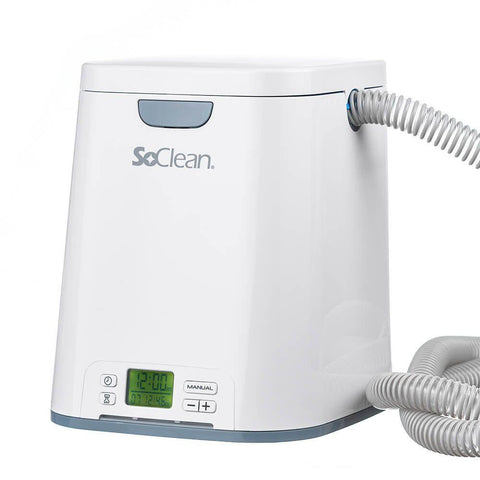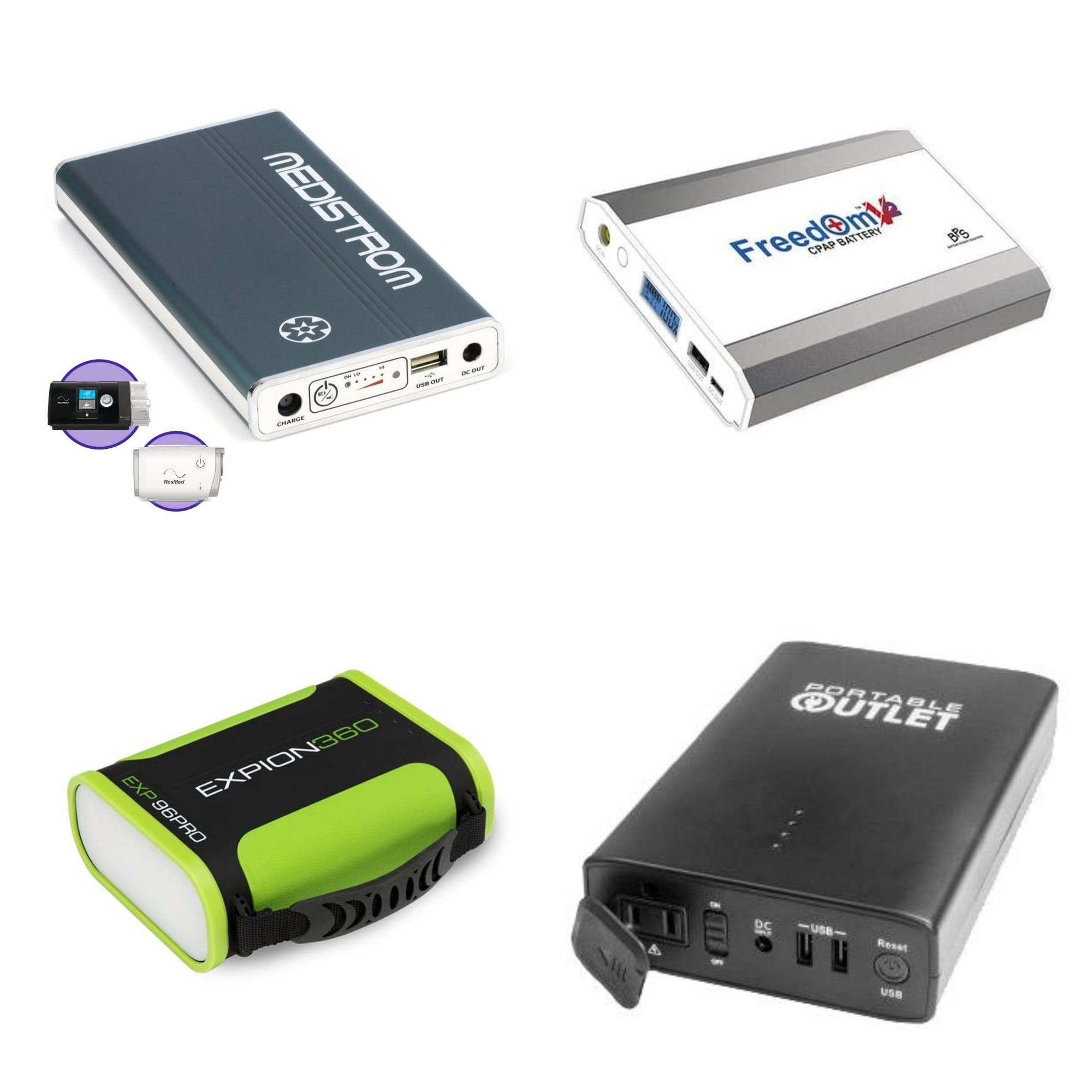If you've been recently diagnosed with obstructive sleep apnea (OSA) or suspect you may have this condition, one of the first things you'll want to know is if your insurance company covers sleep apnea, bipap and cpap supplies. Good news! – the short answer is yes.
Medicare coverage depends on your insurance plans and your provider's specific policies, location, and your sleep apnea treatment prescription. You must also complete a sleep study in a laboratory setting or use an approved at-home test.
If your treatment plan includes Continuous Positive Airway Pressure (CPAP), unfortunately, some important supplies are not covered under insurance, including cleaning supplies, power solutions, or comfort accessories.
What CPAP Costs Are Covered With Medicare?
Your out of pocket costs are 20% of the approved amount for rental of the CPAP machine and purchase of related supplies (like cpap masks and tubing).
The Medicare Part B deductible applies and Medicare pays the supplier to rent the machine for the 13 months if you’ve been using it without interruption. After you’ve rented the machine for 13 months, you own it.
If you have a Medicare supplement plan (Medigap), the plan may cover your CPAP coinsurance payment for the rental period. If you have a Medicare Advantage plan (Part C), you need to check with the plan for details as you will have at least the same benefits as Medicare Part A and Part B.
Medicare will only cover your durable medical equipment (DME) if your doctor or supplier is enrolled in Medicare.
Medicare also cover some replacement supplies including humidifiers, filters, tubing, headgear, and nasal pillows.
Please visit medicare.gov to read what medicare covers, what your copayments are, and what falls within medicare advantage plans depending on your medicare program.
Since keeping your equipment powered and in top safe performing conditions requires long-term care, here is a list of 10 supplies Medicare will not cover but are still worth the investments.

1. The SoClean 2

One of the most important things about a healthy sleep apnea treatment is to keep all your devices and accessories clean and disinfected.
CPAP Masks, hoses and tubes, and other mask parts house bacteria, viruses, and mold that need to be cleaned for your equipment to function properly, live up to its lifespan and keep you healthy.
The SoClean 2 is one of our favorite CPAP cleaners and sanitizer. We love it because it packs a two-in-one punch: you don't need to take equipment apart every day, and it doesn't require water. Plus, it features a drying function, so your devices come out completely clean and dry, with no leftover moisture to encourage bacteria or mold growth.
2. Mask Liners

CPAP mask liners act as a barrier between the skin on your face and the silicone on the mask's cushion, reducing leaks, preventing skin irritations or facial pressure marks, providing a silent night, and increasing comfort. Additionally, the liners also help absorb facial moistures and oils, extending the life of your CPAP mask.
Even though insurance doesn't cover mask liners, we consider them necessary for increased comfort and treatment adherence. Take a look at our article on the best CPAP mask liners.
3. CPAP Battery

CPAP Batteries are a portable, versatile and powerful solution for travel and unexpected events such as power outages. They offer on-the-go confidence knowing that your CPAP machine will stay on through the night, whether you're traveling, on a long flight, or encounter a power outage.
CPAP Batteries give you flexibility and peace of mind knowing that you'll be able to use your CPAP device on the go or in the event of an emergency.
4. Mask Wipes

Mask Wipes are a convenient, fast, and efficient way of keeping your CPAP equipment and accessories clean and sanitized on a daily basis. We recommend keeping a box handy in your nightstand or bathroom top to make it easy and accessible to clean your sleep apnea devices daily.
5. CPAP Headgear Comfort Pads

CPAP therapy is very effective, but it can also feel uncomfortable, especially at the beginning. CPAP Headgear Comfort Pads are a convenient solution to pesky air leaks, red pressure marks, and skin aggravation that make it challenging to stay on therapy.
These comfort pads relieve any discomfort caused by your CPAP mask and make it easier to stay on track with your protocol. If you're having any of these issues with your CPAP mask, consider getting these lifesaving comfort pads.
6. Contour CPAP Pillow

Comfort is the name of the game for CPAP therapy compliance, and having the proper wellness and comfort gear can set you up for success.
A contour CPAP pillow works wonders as it cradles your head and neck, giving you support, pressure relief, and the freedom to sleep in your position of choice while accommodating a full face or nasal mask and hose. Check out our post on the Best Pillows For CPAP Users.
7. CPAP Hose Holder

The CPAP hose holder is an advanced compact suspension system sturdy enough to keep a hose suspended by your bedside or attached to your headboard or box spring to reduce tugging on a CPAP mask during sleep.
If you are struggling with your CPAP tubing equipment getting tangled during your sleep, this device is a lifesaver! Discover our Top 5 CPAP Hose Holders for Better Sleep.
8. Tube Cover/Wraps

If you experience condensation (rainout) in your standard tubing, the tube wrap/cover is helpful in decreasing condensation within the hose.
They are made with soft and smooth material that slides easily across your bedding, reducing drag and noise and improving the overall therapy experience.
9. Nasal Pads
Nasal pads help to reduce nasal skin irritation, soreness around the nasal bridge and mask leaks by providing extra padding between the bridge of your nose and your mask. They are usually made from safe, hypoallergenic, silicone-free, latex-free, and washable materials.
10. DC CPAP Power Cords
Power cords are ideal companions when you're on the go. DC Power Cords connect to sources like the cigarette style power outlets found in most vehicles to easily operate and power your CPAP machine.
The Takeaway
Maximizing your health insurance benefits is essential. Make sure that you know as much as possible about what your health insurance coverage including supplemental and prescription drug coverage, and work closely with your equipment provider and healthcare providers to take charge of your CPAP therapy.
However, also remember that the most important part of CPAP therapy is compliance. Unfortunately, most wellness and comfort accessories are not covered by insurance but are still an essential part of your treatment.


















































